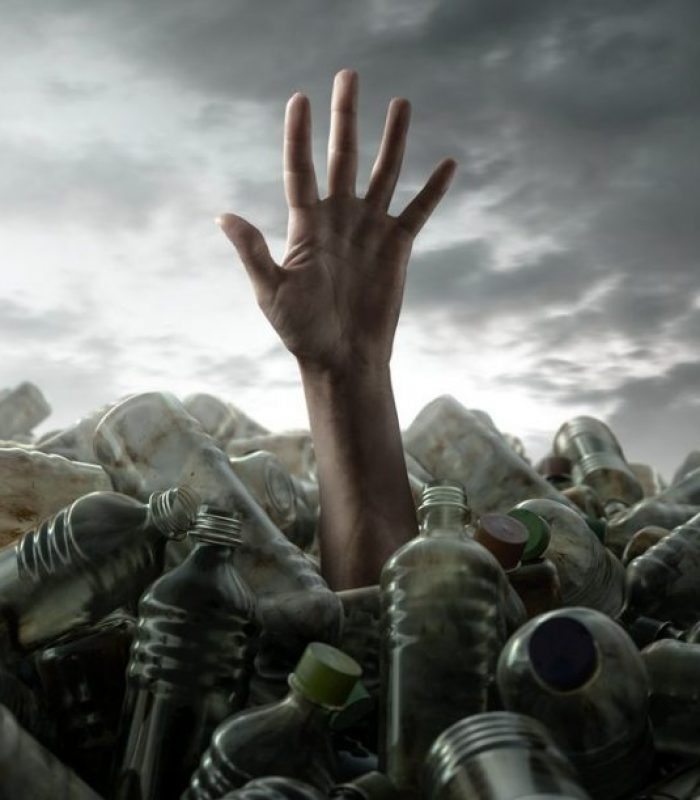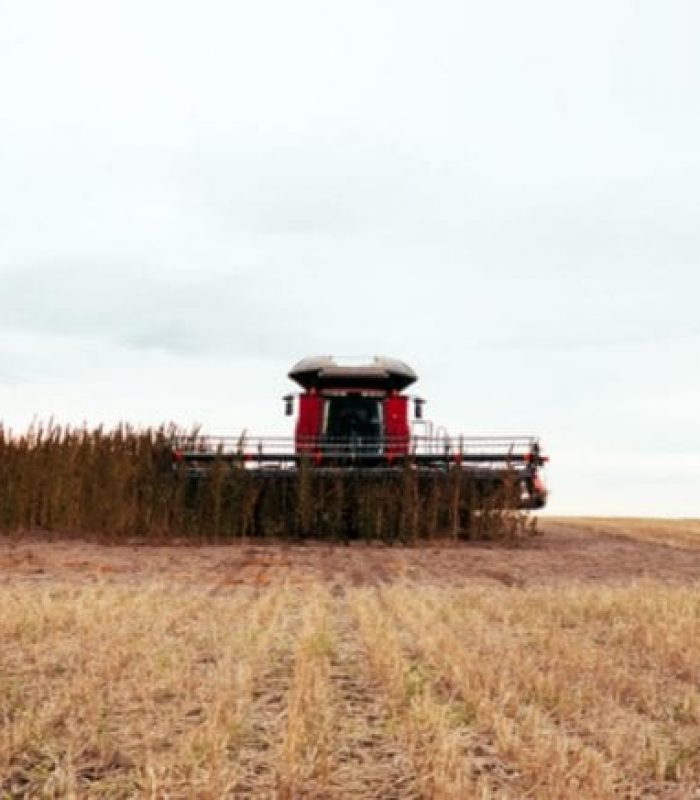Hemp plastic is supposed to save us from inevitable burial in a plastic mountain. It can’t.
We hear it a lot these days: hemp plastic to replace everything that is synthetic plastic. And it may be an affordable, plausible solution for single-use plastics, but what about the items that need a longer shelf life? Things that come to mind include: cell phone covers, water bottles, car parts, binders, storage containers, glitter, etc. And then there is the problem of decomposition — not so easy nor automatic.
The average American sends around 185 pounds of plastic each and every year to the dump. And this is no light matter. Plastics are choking our oceans, killing marine life, polluting soil and the air, and winding up in the digestive systems of all animals. The consequences of the latter are still unknown. Last year, an investigation by National Geographic reported that ninety one percent of plastics in the world are NOT recycled.
Why do we Ignore the Problem with Plastic?
If those figures are already upsetting you, you may want to sit down. We already know that plastic is far from environmentally friendly. However, if we don’t figure out a solution, the world will soon be overrun with it. Literally. The average plastic takes an excess of four centuries to break down. No wonder animals in the air, sea, and land are having a hard time avoiding it in their diets.
And a study cited in National Geographic, which “is the first global analysis of all plastics ever made”, offered some other terrifying statistics. According to the article, “Of the 8.3 billion metric tons that has been produced, 6.3 billion metric tons has become plastic waste. Of that, recycling only accounted for nine percent. The vast majority — 79 percent — is accumulating in landfills or as litter.” In fact, the researchers estimated that “by 2050, there will be twelve billion metric tons of plastic in landfills.”

The lead author of the study, Roland Geyer, explains that plastic has a short shelf life. Around half of it is tossed away to a landfill or becomes litter. This inevitably contributes to the eight million metric tons of non-fiber plastic that ends up in the ocean within a year of production.
And sadly America is lagging behind in tackling this problem. While Europe, as a continent, recycles around thirty percent of its plastics, and China twenty five percent, America remains at a staunch nine percent despite serious warnings by the world’s brightest scientists of the damage humans are doing to our planet.
Alternatives to Plastic: BioPlastics
Needless to say, the world needs a solution – desperately. At this rate, there will be a greater mass of plastic in our oceans than marine creatures within three decades.
The study found that roughly forty percent of plastic is packaging or a one-time use material, such as forks and spoons, which are thrown away shortly after purchase. The bright spot is that of the total “in-use” plastic, on the globe, around 1.1 million metric tons of it is bioplastic. This is mainly biodegradable products made from corn or soy.
The main issue bioplastics have in competing on the market is production cost. To viably compete with petroleum plastics, bioplastics need to be either on par, or more realistically, cheaper than traditional, non-decomposable plastics. Strange that humans would rather literally choke on plastic than pay extra for a responsible product.
Jim Happ of Labcon North America estimates that to really outdo petroleum plastic, hemp and other bioplastics would need a rough price of US$1.27/lb. And that’s just not an achievable reality with current technologies.

What About Hemp Plastic?
Hemp is worth around US$2.35/lb, according to Green Springs Technologies. The biggest issue for converting it into plastic is creating moldable long fatty acid chains. This is easier with fossil fuels, which naturally produce these chains. The fibres from hemp plants require manufacturing for this, and that gets pricey.
World governments need to invest in research to improve technologies around hemp. Although President Trump is a climate change denier, his government did have a hand in legalizing hemp, so there is a modicum of hope.
A second sticking point for hemp plastic is that it won’t efficiently biodegrade in the dump; it needs special plastic compost centres. These centres would guarantee the plastics fully degrade and decompose within six months. This is just another added expense that, unfortunately, most countries haven’t yet opted for.
Is Hemp Plastic up to the Job?
Honestly, hemp may be a little too biodegradable for most of our needs. It will begin to degrade within its first year of production. This is a huge issue for items that require a longer life.
To solve this, industries have had to combine hemp plastic with additives like polymer to ensure the efficacy and necessary longevity of the plastic. So, there goes the biodegradable factor.
The Bad News for Us
Biodegradable plastics will only fully decompose in appropriate settings, with the appropriate amount of pressure. Unfortunately, the ocean isn’t one of those settings. Jacqueline McGlade, chief scientist at the UN Environment Programme, explains, “It’s well-intentioned, but wrong. A lot of plastics labeled biodegradable, like shopping bags, will only break down in temperatures of 50C and that is not the ocean. They are also not buoyant, so they’re going to sink, so they’re not going to be exposed to UV and break down.”
Swallowing hemp plastics may be safer than swallowing petroleum plastics. However, marine animals will still be in danger with these products. And McGlade added that there were other issues that arise from the addition of biodegradable materials to plastic when trying to make them more eco-friendly: “When you start adding all of that, when it becomes waste, they (the additives) become the enemy of the environment.”

Image credit: Hemp Plastic Company
Humans to Blame
McGlade, and other experts, argue that the material out of which plastic originates isn’t the largest issue. Our general mass use of plastics is.
The fact is that, unfortunately, people aren’t going to up and quit plastic right away. Some companies, like The Hemp Plastic Company, want to promote biodegradable plastics as the end-all solution. But we have to face the fact that these not not our salvation. Only a determined change in purchasing and storage habits will stop this rapid burial in plastic waste.
As we work on this massive cultural shift, more eco-friendly additives, like hemp, that won’t automatically end up in landfills, may be a positive way to reduce the extravagant fossil fuel emissions that accompany plastic production.
Companies like Lego and Ikea that produce more permanent products from plastic and Coca-Cola and the Body Shop with single use bio-plastics, are using their influence to force a change in the market. After all, some scientists are positive that this is a step in the right direction. Even if we need other more effective solutions long-term.
The question we need to reconcile within ourselves is, why even make a new kind of plastic when we should choose more sustainable materials and lifestyle?






Jason Dawson
I say keep trying hemp plastics, someone will find the right ratios/additives to make it a viable option. AND, if they can only use it for single use, so be it for now, at least thats “X”-amount less to deal with, and use petro-plastics for lego’s, car parts, furniture etc till there’s a permanent solution in these applications.
Also, if single use hemp plastics are more expensive, hopefully that will cause ppl to be more conscious of their decisions/habits and choose to come up w/ alternative options like my grandmother, who uses an old sunglass case to carry utensils in her purse.
Its kinda funny that we spend billions of dollars and decades, researching things like cancer or quality of life stuff like arthritis, but give up and say hemp-plastics are not a viable option after far less R&D/$, when it affects the ENTIRE planet, not just the ppl destroying it……..SMH
Basically, no immediate money for bettering the planet, but a fortune in treating ailments for life……..and you call these ppl elite, personally I call them parasites, feeding of ppl, and environment for personal gains.